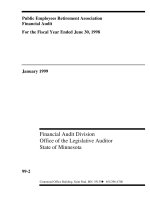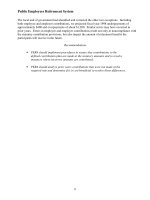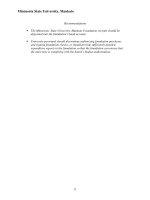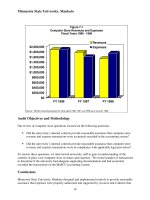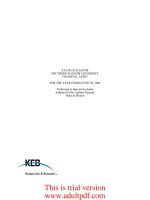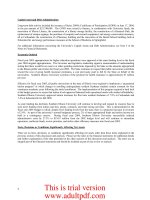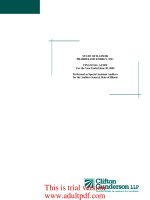Bemidji State University Financial Audit For the Three Fiscal Years Ended June 30, 1998 September 1999 _part3 pptx
Bạn đang xem bản rút gọn của tài liệu. Xem và tải ngay bản đầy đủ của tài liệu tại đây (37.14 KB, 8 trang )
Bemidji State University
17
Chapter 6. Student Financial Aid
Chapter Conclusions
Bemidji State University designed and implemented internal controls to provide
reasonable assurance that fiscal year 1999 federal student financial aid
transactions were properly authorized for eligible students and accurately
recorded in the accounting system. In addition, for the items tested, the
university complied with federal student financial aid requirements over cash
management and federal reporting. However, the university did not adequately
separate duties over financial aid or assign uncollectible Federal Perkins loans
to the U.S. Department of Education.
Bemidji State University uses a computerized application to package and award financial aid.
The financial aid module is one of the 17 modules that make up MnSCU’s Integrated Student
Record System (ISRS). The financial aid module interfaces with other modules within the ISRS,
such as the accounts receivable and student records modules. It electronically receives and
stores the Student Aid Report from the federal processor and accepts and stores the institutional
financial aid application and tax data from the student. The module runs a comparison of
application data provided by the student to the Student Aid Report and identifies any
discrepancies, beyond accepted tolerances, in a process called ‘verification.’ The system
enforces compliance with federal and state financial aid program requirements through a series
of computerized edits that are activated at the discretion of the institution. Through interfaces
into the accounts receivable module, the system automatically modifies awards by updating for
actual disbursement of aid to the students. Similarly, adjusted expenditures are interfaced into
MnSCU accounting.
The system provides interactive packaging, awarding, and disbursing of federal and state
financial aid. The system automatically verifies applicants’ compliance with specific
requirements and determines the financial need and applies awards to students’ accounts in the
accounts receivable module. The system verifies enrollment before disbursing the awards. The
system adjusts the amount of the award if a student’s enrollment drops after the initial
application of funds.
Bemidji State University participates in a variety of federal and state financial aid programs as
discussed below.
The Federal Pell Grant is considered the first source of assistance to eligible students. Eligibility
for the grant is based on the cost of education, the family's ability to pay, and the student’s
enrollment level. Pell grant funding is not limited to funds available at an institution. The
maximum Pell grant for the 1998-99 award year was $3,000 per student.
Bemidji State University
18
The William D. Ford Federal Direct Loan Program was established so students could borrow
money directly from the federal government. The university certifies information on the
promissory note for qualifying students. The Direct Loan Program has four types of direct loans
including the Federal Direct Stafford/Ford Loans, Federal Direct Unsubsidized Stafford/Ford
Loans, Federal Direct PLUS Loans, and Federal Direct Consolidation Loans. Students must
show financial need to receive the Federal Direct Stafford/Ford Loans. The maximum loan
amounts depend on several factors which may include the borrower's grade level, the length of
the academic program, the dependency status of the student, the cost of education, the amount of
other financial aid the student will receive, and the expected family contribution.
The Federal Perkins Loan Program provides low-interest loans to needy students. The university
acts as a lender, using both federal funds and a state match for capital contribution. The
university performs loan collection duties including corresponding with students entering
repayment status, receiving loan repayments, and pursuing delinquent loans.
The Federal Work-Study (FWS) Program and Federal Supplemental Educational Opportunity
Grant (FSEOG) are additional sources of federal financial aid. The federal government share
must not exceed 75 percent of the total expenditures in the FSEOG and FWS Programs. The
state contributes the remaining 25 percent of the program funding.
Bemidji State University also participates in the Minnesota State Grant Program, Minnesota
State Work-Study Program, and the Student Educational Loan Fund (SELF) Program offered by
the Minnesota Higher Education Services Office (HESO). The university packages these aid
types along with federal financial aid.
Audit Objectives and Methodology
Our review of Bemidji State University’s student financial aid programs for fiscal year 1999
focused on the following questions:
• Did the university design and implement internal controls to provide reasonable
assurance that student financial aid transactions were properly recorded in the accounting
system, accurately reported to the federal government, and administered in accordance
with applicable federal regulations?
• Did the university comply with applicable federal requirements over receiving federal
funds and preparing applicable federal reports?
• Did the university design and implement internal controls over packaging and awarding
federal financial aid to provide reasonable assurance that only eligible students received
aid in the appropriate amounts?
To address these questions, we interviewed employees from the financial aid and business
offices to gain an understanding of the internal control structure related to student financial aid.
We evaluated and tested controls over compliance for determining student eligibility, packaging
and awarding, and disbursing federal financial aid funds. In addition, we reviewed university
records and tested controls to ensure compliance with regulations governing federal cash
management and financial reporting.
Bemidji State University
19
Conclusions
Bemidji State University designed and implemented internal controls to provide reasonable
assurance that fiscal year 1999 federal student financial aid transactions were properly authorized
for eligible students and accurately recorded in the accounting system. In addition, for the items
tested, the university complied with federal student financial aid requirements over cash
management and federal reporting. However, the university did not adequately separate some
duties over financial aid, as discussed in Finding 5, or assign uncollectible Federal Perkins Loans
to the U.S. Department of Education, as noted in Finding 6.
5. Bemidji State University did not adequately separate some incompatible duties within
the financial aid process.
Bemidji State University did not adequately safeguard financial aid funds by separating some
incompatible duties within the financial aid process. First, the financial aid office awarded SELF
program loans and received SELF loan checks from HESO. The financial aid office forwarded
the checks to aid disbursement, where employees released checks to students. The university
received most student loan program funds by electronic funds transfer. However, SELF loan
proceeds were not transferred electronically but were sent to the financial aid office. Good
internal controls require a separation of incompatible duties. In the financial aid process,
employees who award financial aid funds should not have access to those funds.
Second, employees in aid disbursement had access to both the Federal Perkins Loan repayments
and the Perkins loan system. These same employees tracked outstanding loan receivables and
granted deferments, cancellations, and postponements. Good internal controls require that
employees with access to the repayments not have access to the loan records as well.
Recommendation
• Bemidji State University should separate incompatible duties within the
financial aid process.
6. Bemidji State University did not assign uncollectible Federal Perkins Loans to the
United States Department of Education.
The university had not assigned uncollectible Federal Perkins Loans to the United States
Department of Education for about five years. Federal regulations allow schools to assign
accounts to the United States Department of Education if the school has exhausted all collection
efforts. The university used a variety of collection efforts, including internal collection
procedures, Minnesota Revenue Recapture, Minnesota Collection Enterprise, and private
collection agencies. The university continued to hold these accounts even after numerous
collection attempts were unsuccessful. Financial aid staff estimated that the university had about
70 borrowers who had not made payments on their accounts for more than ten years.
Recommendation
• Bemidji State University should assign uncollectible Federal Perkins Loans to
the United States Department of Education if the university cannot collect
after following all collection procedures.
Bemidji State University
20
This page intentionally left blank.
Bemidji State University
21
Status of Prior Audit Issues
As of June 11, 1999
Most Recent Audits
Legislative Audit Report 99-19, issued in March 1999, covered material financial statement
areas and federal financial aid programs administered by the State of Minnesota in fiscal year
1998. We audit these areas on an annual basis. This report did not include any findings
specifically related to Bemidji State University.
Other Audit History
Legislative Audit Report 98-16, issued in March 1998, covered material financial statement
areas and federal financial aid programs administered by the State of Minnesota in fiscal year
1997. This report included one finding related to Bemidji State University and other MnSCU
institutions. The finding stated that Bemidji State University had not completely reconciled its
local bank accounts to the MnSCU accounting system. We cited a similar issue in the current
report as Finding 1 in Chapter 2.
State of Minnesota Audit Follow-Up Process
The Department of Finance, on behalf of the Governor, maintains a quarterly process for following
up on issues cited in financial audit reports issued by the Legislative Auditor. However, Finance
has delegated this responsibility for audits of the Minnesota State Colleges and Universities
(MnSCU) to the MnSCU Office of Internal Auditing. MnSCU's Office of Internal Auditing process
consists of quarterly activity reports documenting the status of audit findings. The follow-up
process continues until the Office of Internal Auditing is satisfied that the issues have been resolved.
The process covers all colleges and universities within the MnSCU system.
Bemidji State University
22
This page intentionally left blank.
BEMIDJI
STATE UNIVERSITY
OFFICE OF THE PRESIDENT
218-755-2011 / FAX: 218-755-4048
August 28, 1999
Mr. James R. Nobles
Legislative Auditor
First Floor South, Centennial Building
658 Cedar Street
St. Paul, MN 55155
Dear Mr. Nobles:
This letter is Bemidji State University’s response to Mr. Donahue’s audit team findings for the
period from July 1, 1995 through June 30, 1998. I believe the following responses to your audit
findings will adequately address the areas of concern.
Finding #1: Bemidji State University did not fully verify, on a timely basis, that MnSCU
accounting agreed with financial activity recorded in the local bank account
and the state treasury.
Response: Bemidji State University will complete reconciliations each month between
activity posted to MnSCU accounting and the state’s accounting system
(MAPS). We have reconciled MnSCU accounting with local bank activity for
the last 13 months to a consistent difference of $6,356.71
Finding #2: Bemidji State University did not adequately restrict certain employee computer
access privileges.
Response: All student employees will have their own access clearances for approved
transactions in MnSCU accounting. The accounts receivable module access
has been reviewed and only those with specific need have access. BSU will
continue to work with the MnSCU System Office to redesign security groups
that contain incomplete functions. BSU will routinely monitor computer
security clearances.
Finding #3: Bemidji State University’s relationship with its affiliated foundation may not
conform to the MnSCU policy on foundation relationships.
Response: Bemidji State University will work with the MnSCU System Office to reassess
the level of management involvement with the foundation and conformance to
MnSCU policy.
____________________________________
Deputy Hall 1500 Birchmont Drive NE Bemidji, MN 56601-2699
A Member of the Minnesota State University System
Bemidji State University is an equal opportunity educator and employer
-2-
Finding #4: Bemidji State University did not adequately separate duties over the collecting
and recording of revenue.
Response: We agree with the finding and will have the cashier supervisor periodically
verify ending cash at unannounced times. In addition, that person will review
corrections made by Cashiers. A separation of duties process is in place to
cover situations such as occurred in the recreation center and is currently being
reviewed by our regional internal auditor. Tuition waivers will be audited by a
list of waiver recipients processed at the end of each term and verified by the
authorizing office.
Finding #5: Bemidji State University did not adequately separate some incompatible duties
within the financial aid process.
Response: Bemidji State University feels that the employees who award financial aid
funds (SELF) do not have access to the SELF loan checks from HESO. While
the individuals are housed in the Financial Aid Office, there is separation of
awarding and receiving. The Perkins repayment will be opened and tallied by
the Cashiers staff before being posted into the LMS system.
Finding #6: Bemidji State University did not assign uncollectible Federal Perkins Loans to
the United States Department of Education.
Response: Bemidji State University will review the federal regulations and assign
uncollectible loans as recommended.
The persons responsible for resolving the above findings are Mr. Gerald Amble, Business
Manager, and Mr. Jerry Winans, Director of Accounting. We expect the issues will be resolved
by November 30, 1999. We believe this addresses all the findings. Should you have any
questions please feel free to call. I would like to take this opportunity to compliment your audit
team on their professionalism during their visit.
Sincerely,
M. James Bensen
President
